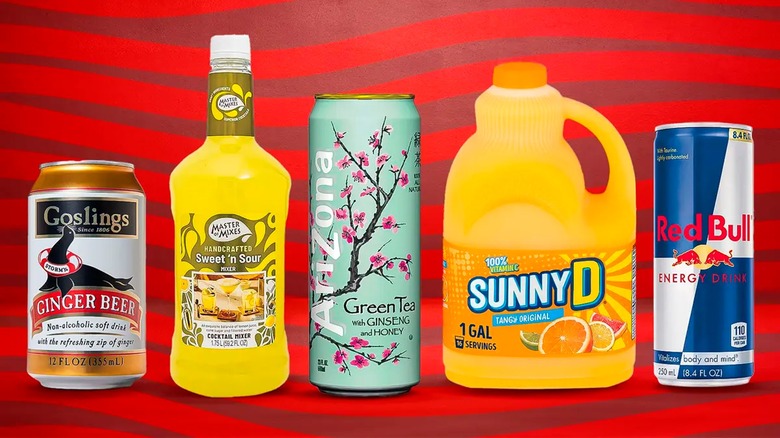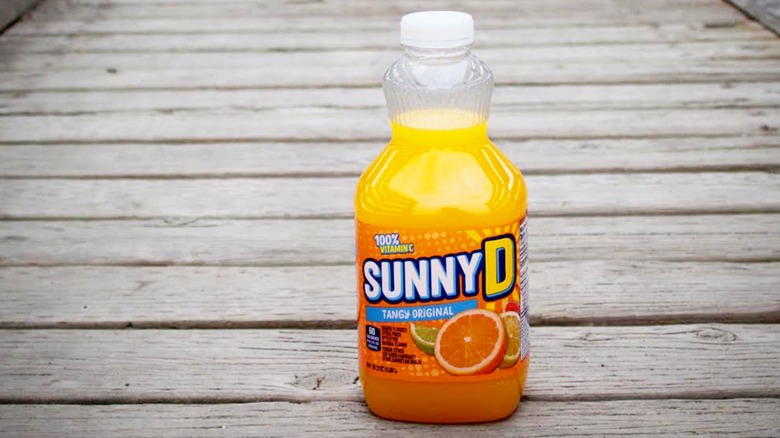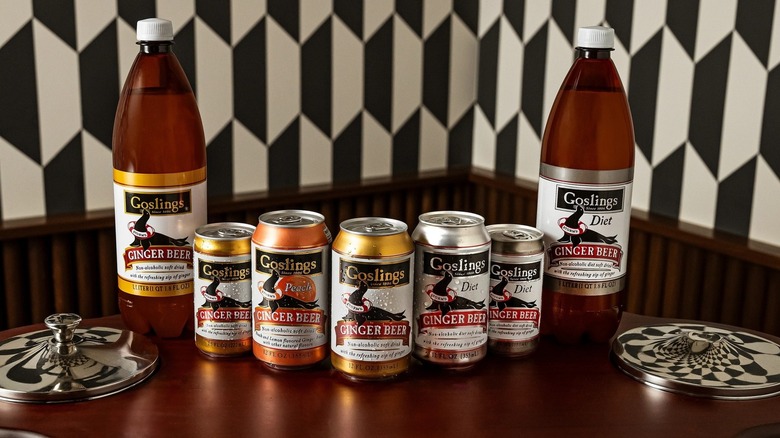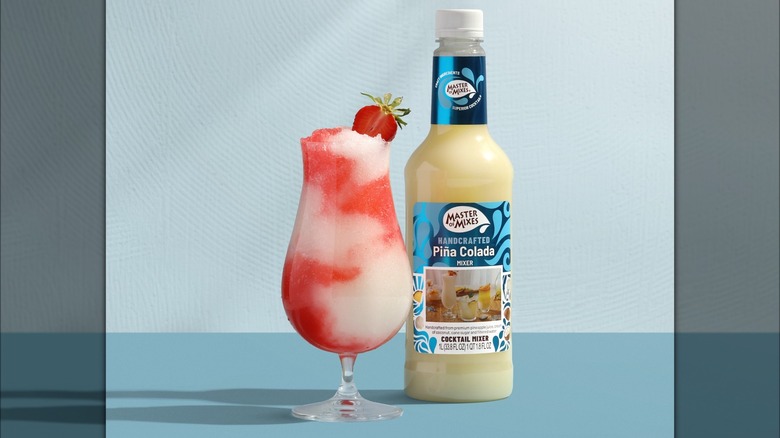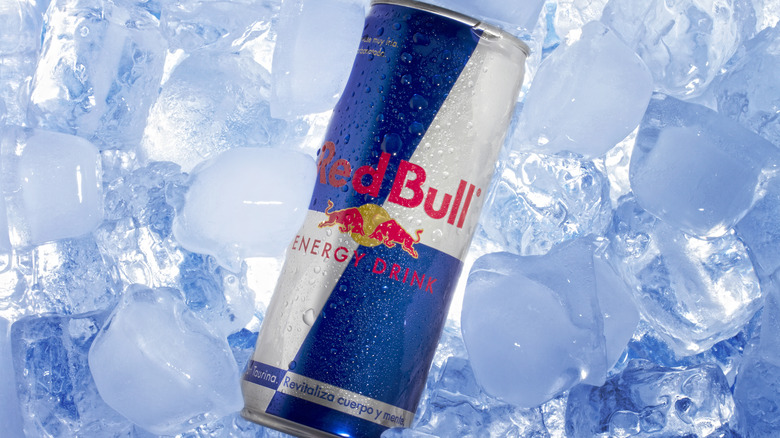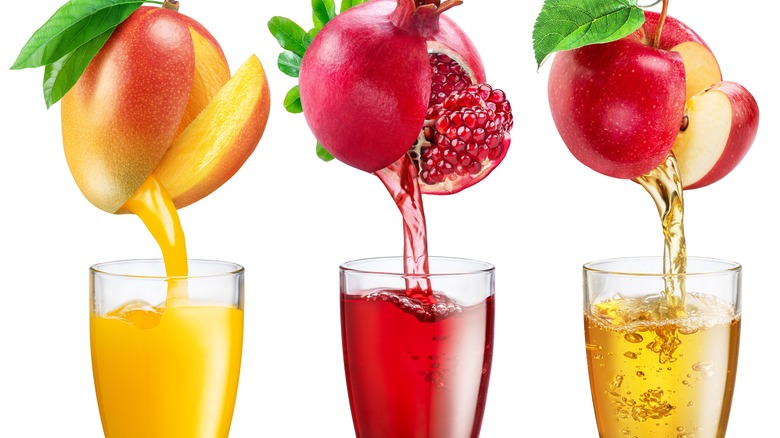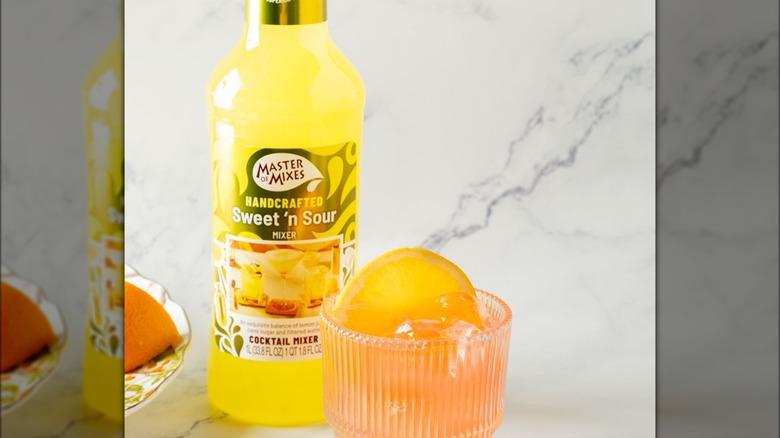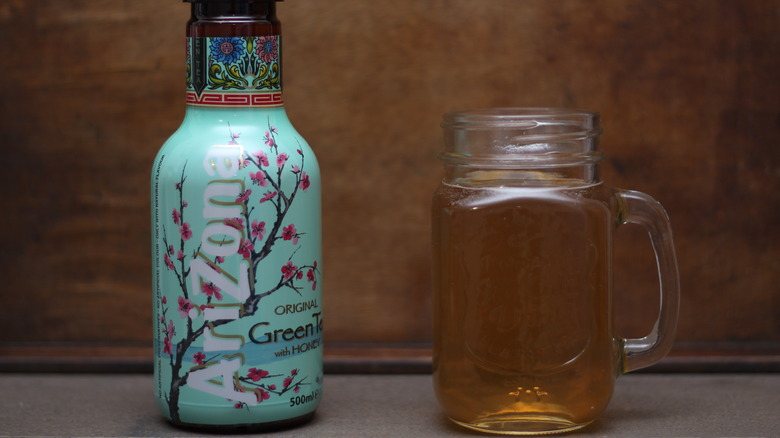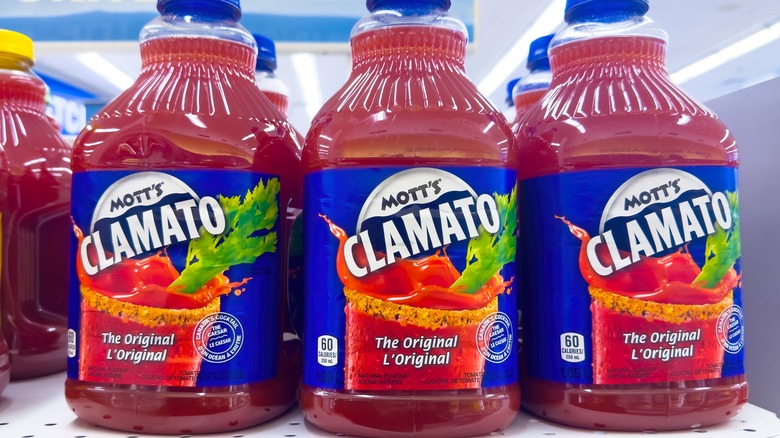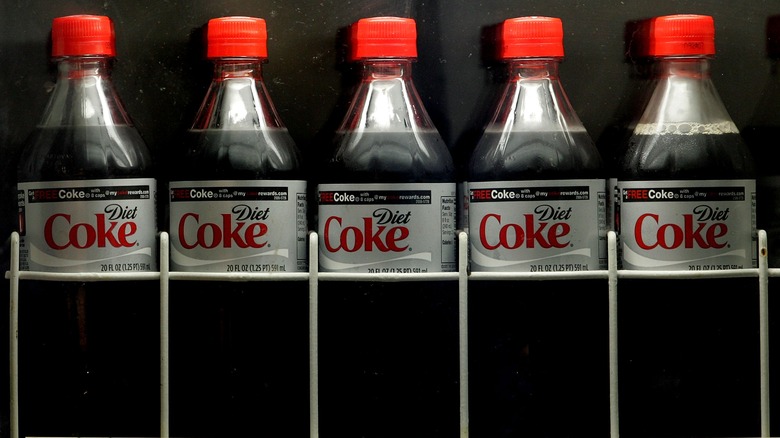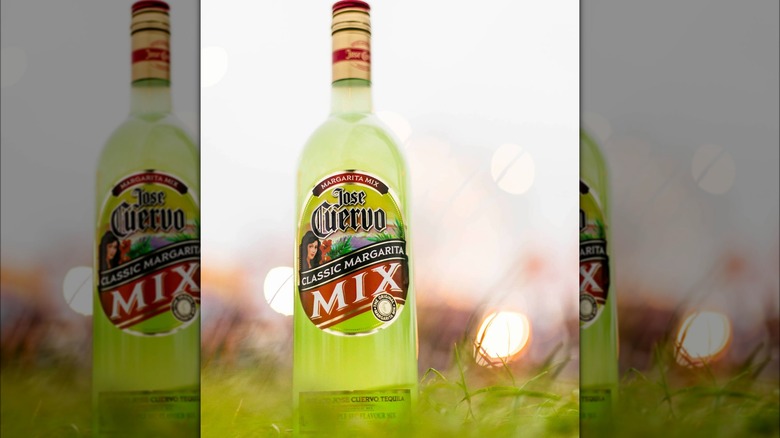10 Cocktail Mixers To Avoid When Stocking Your Bar
Some nights, you just want to kick back and enjoy a spirit, like whiskey, on its own — as in neat or on the rocks. But other times, you might prefer to enhance the potential deliciousness of your boozy concoction with an additional ingredient. A simple mixed drink or cocktail simply hits the spot sometimes, and they don't have to be complicated to be enjoyable. Of course, while there's some debate regarding the difference between a cocktail and a mixed drink, we can say that some mixers should undoubtedly be avoided when stocking your home bar or pantry.
Now, to be fair, certain popular cocktail mixers might be perfectly fine on their own. However, they can also end up overpowering any alcohol you mix with it. Additionally, some mixers contain a shocking amount of sugar (along with other mystery ingredients), while others have been found to interact with alcohol in potentially dangerous ways.
So before you check out our list of mixers and ingredients that you should have on hand at all times, allow us to discuss which cocktail mixers you should steer clear of buying when restocking your bar. Even if you're a little surprised by some of the items included, trust us when we say you'll thank us later.
SunnyD
We all know mimosas have become the ultimate brunch cocktail, but there's nothing wrong with enjoying a mimosa on a hot summer's evening, either. Consequently, you might be tempted to stock up on SunnyD as a shelf stable version of orange juice, but we're here to say you should probably avoid doing that.
While it might seem pretty great to have this orange juice option on hand, there's a downside to SunnyD: it's not actually orange juice. At all. If you take a look at the ingredients, you'll see that one bottle contains less than 2% of concentrated orange, tangerine, apple, lime, grapefruit, and pear juices. Instead, it's almost entirely made up of water and high fructose corn syrup.
Though high fructose corn syrup has been around for decades, the highly processed sweetener has been slowly falling out of favor during the 21st century because of the potentially negative health effects associated with consuming it in large quantities. Since a plethora of health risks are associated with the excessive intake of added sugar, the bottom line is this orange-flavored sadness drink should be skipped in favor of the real deal when mixing a cocktail.
Goslings Ginger Beer
Goslings Ginger Beer is the mixer that's needed for the official version of Goslings Dark 'n Stormy, which is just rum and ginger beer with a lime wedge. Now, you can lighten up your next Dark 'n Stormy by swapping in ginger ale – and you might want to do that once we tell you just how much sugar is in a single can of this brand's ginger beer.
One can has 47 grams of sugar, which might not mean much alone. But that amount is more than the American Heart Association's total recommended daily intake of added sugar for adults (36 grams per day for men, and 25 grams for women). Considering the average American consumes way more added sugar than is ideal each year, the amount ingested from two mixed drinks — using two cans of Goslings Ginger Beer — is enough to give us pause.
Of course, sometimes you just need something sweet, which we get. With that in mind, we suggest making your own ginger ale with just five ingredients instead, which will allow you to control the sugar and make a mixed drink that's just as sweet as you'd like it.
Master of Mixes Piña Colada
Some cocktails appear incredibly complicated, like the piña colada. These sweet, creamy drinks seem like the sort of complicated beverage you can only get at a restaurant, so the idea of keeping a piña colada mix on hand is a tempting one. But should you? Well, as you can probably guess, the answer is no.
There are a few problems with premade piña colada mixes — particularly the Master of Mixes Piña Colada option. First, if you take a peek at the nutritional information on the bottle, you'll find that a single serving has 50 grams of sugar, which is twice the recommended daily intake of added sugar for women. Even if a piña colada should be sweet ... does it have to be that sweet? It just seems excessive, right? Plus, most of that sweetness comes from the first ingredient mentioned in high fructose corn syrup (which is hardly an ideal sweetener, as we mentioned before).
More than that, making a piña colada isn't as difficult as you might think. We even have a piña colada recipe that relies less on heavily processed ingredients, and more on frozen pineapple chunks, pineapple juice, and cream of coconut. Skip the Master of Mixes bottle, then, and mix up the real deal. You won't regret it.
Red Bull (and other energy drinks)
We get it: Mixing your favorite energy drink with vodka seems like a total win. But experts generally agree it's a bad idea to combine energy drinks with alcohol for several reasons. In fact, while you may believe the potential dangers are blown out of proportion, some vodka companies (like Pristine Vodka) have even warned consumers against using energy drinks as a mixer.
Think of it as a balancing act inside your body. Alcohol is making you feel more relaxed, while the caffeine in a Red Bull (or another energy drink) is keeping you alert and awake. At the same time, the caffeine makes you feel less intoxicated, which can encourage you to drink more — even though you're not actually less drunk because your body can only process so much alcohol.
Additionally, some studies have found energy drinks may lead to an increase in blood pressure and decreased function of blood vessels. This can be dangerous when mixed with alcohol, especially over a long period of time, as drinking alcohol also tends to raise one's blood pressure. Given the potential risks involved with mixing energy drinks and vodka (or whatever alcohol you prefer), take our word, and skip these cocktail mixers when stocking your bar.
Some juices from concentrates
You might not think of mixers with wine, but you absolutely should. After all, when Tasting Table took a look at 20 of the tastiest drinks to mix with wine, there were a lot of juices on the list. And while you can combine pineapple juice with a white wine or grapefruit juice with prosecco, you should definitely skip some of the juice concentrate options on store shelves.
For starters, not all juice concentrates are created equal. For example, when concentrates are made by removing most of the water content, the process also removes a lot of the flavors. But rather than selling bland juice, a variety of additional ingredients might end up being incorporated, including high fructose corn syrup, sugar, sodium, artificial flavors, and something called flavor packs. Interestingly, flavor packs don't need to be identified as an ingredient when they're used, because they're made from the same chemical building blocks that make up, say, real oranges or grapefruits.
These flavor packs are also why various types of juice concentrates often taste different than the fruit they're supposed to be. Consequently, while some juice concentrates might be fine — and a source of nutrients — others might have a lot of additional sugar and ingredients, while missing those vitamins and dietary fiber. Given this, read the labels, opt for 100% fruit juice concentrate, and skip the others.
Master of Mixes Sweet 'n Sour Mixer
Sorry, Master of Mixes, but we're back to you again. This isn't even the first time we've suggested you should skip a premade sour mix for cocktails – and we're not alone in this recommendation, either. Reddit is full of debates over what precisely makes this premade sour mix so bad and why people keep using it. More than that, countless others have pointed out it's simply unnecessary to purchase or use this mixer because you can do better on your own.
Quite frankly, that's part of our issue with this mixer, too: It's easy to make a tastier version yourself, and it'll keep for a lengthy period of time in the fridge. For instance, this blood orange sour mix recipe is simple to prepare — and you won't be buying a whole load of questionable ingredients in the process.
After all, check out the nutritional label on Master of Mixes Sweet 'n Sour Mixer, and you'll notice a single serving (which is only 3 fluid ounces) contains 21 grams of sugar. If you plan on making two drinks, then, or if you like your cocktail extra sour, you'll easily end up ingesting close to a full day's worth of added sugar in your cocktail, so skip this mixer at the store.
Iced tea (such as Arizona, as well as powdered mixes)
Let's talk about iced tea — specifically, premade teas and powdered mixes. While these may seem like super convenient options when you'd like a quick vodka tea, that doesn't mean you shouldn't avoid these mixers, either.
The culprit here is sugar. For example, a single 16-ounce bottle of Arizona green tea contains 34 grams of sugar, while the brand's 20-ounce peach tea has 36 grams of sugar; its 20-ounce sweet tea has less than either of those options, though comes with a still-hefty 32 grams of sugar. Additionally, Country Time's Sweet Tea premade powdered mix isn't much better. The nutritional information lists sugars at 22 grams, but that's only for a single ½ scoop. Keep reading the label, and you'll see it also recommends using four total scoops for 2 quarts of iced tea — meaning you'll end up ingesting far more sugar than is ideal (or expected) with your cocktail.
Rather than buying these premade bottles, cans, and mixes, make your own iced tea. Not only can you control the amount of sugar, but checking out the herbal tea offerings will provide you with endless ways to mix and match flavors for something extra delicious.
Clamato
Don't be the person that brings Clamato to the party. Just ... don't. We're sure some people love this drink, and that's fine. But that doesn't mean those individuals are in the majority. After all, Clamato is exactly what it sounds like: a beverage that combines tomatoes and clams. If we had to bet, we'd wager this started as a practical joke, but then things got out of hand — and here we are. Either way, be sure to steer clear of this bizarre mixer.
Now, Clamato remains a popular thing in its native Canada (as a key ingredient in a bloody Caesar cocktail). But anyone who dislikes Clamato would be forgiven for thinking it's a Canadian prank on the rest of the world. The slightly more official story, of course, is that Canadian bartender Walter Chell was trying to create a specialty cocktail for a restaurant opening in 1969. Clams, tomato, alcohol, and the typical seasonings of pasta vongole ended up in a glass, leading to Clamato (which Mott's eventually ran with).
While folks appear to be pretty split on Clamato — some swear by it, others claim they've never seen anyone voluntarily drink it (and can't imagine a world where anyone would) — we suggest you skip this one when stocking up on cocktail mixers for your home bar or a party. Since this mixer is more likely to get thrown out the window when you're not looking, opt for something that everyone can enjoy.
Diet sodas
Diet sodas have been around for a long time, starting with Tab in the early 1960s. That's gone the way of the dodo, but there are plenty of other diet options on the market. If you're one of those who reach for diet sodas to use as a mixer, you might want to stop doing that for a surprising reason.
Research has suggested that diet sodas alone can be associated with some strange physical phenomena, like insulin confusion. When you drink something sweet, after all, it signals your body to produce insulin to process the sugar. When you drink diet soda, though, insulin is triggered but there's no sugars to process. This can interfere with blood glucose levels, potentially leading to health problems such as insulin resistance and diabetes. There's even a theory that frequently drinking diet sodas can change the way we crave sweetness and calories — and things get even more complicated when you mix diet sodas with alcohol.
Because diet soda is processed more quickly by the body, some research suggests the alcohol that's mixed with it is also processed quicker. As a result, you might end becoming intoxicated much faster than anticipated if drinking a cocktail with diet soda. With this in mind, avoid the diet options, and make it a regular soda with your mixed drink.
Jose Cuervo Margarita Mixes
Seriously, who doesn't love a margarita? They're pretty much the perfect drink for enjoying on a hot summer day, after all, and it might seem like Jose Cuervo's line of Margarita Mixes makes things easier. But there are a few things worth mentioning here, and they might just make you rethink picking up these shortcuts as a cocktail mixer.
First — and perhaps unsurprisingly — there's the sugar. The standard mix contains 26 grams of sugar per serving, while Jose Cuervo's Strawberry Lime Mix contains 27 grams. In both cases, that's higher than the amount of added sugar the American Heart Association suggests women should consume in an entire day (and not much less than the suggested intake for men). While you might expect there to be a lot of sugar in these drinks, there's another sneaky ingredient to consider: sodium. If you're watching your sodium levels and trying to limit your intake to a minimum, you might be surprised to know the regular mix contains 175 milligrams per serving.
Of course, it's also incredibly easy to make your own margarita, like this classic frozen margarita recipe. The only salt is on the rim (which you can leave out if preferred), while most of the sugar comes from agave syrup and fresh fruit. Plus, you can control just how sweet or sour you'd like it. We know shortcuts are tempting for a reason, but sometimes, it's worth making the real deal.
